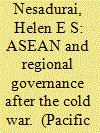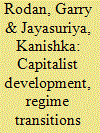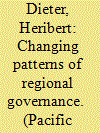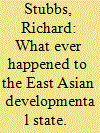|
|
|
Sort Order |
|
|
|
Items / Page
|
|
|
|
|
|
|
| Srl | Item |
| 1 |
ID:
087564


|
|
|
|
|
| Publication |
2009.
|
| Summary/Abstract |
This paper first reviews and critiques the dominant realist and constructivist accounts of ASEAN, which have enjoyed much prominence in The Pacific Review since the journal's founding in 1988. ASEAN behaviour and outcomes cannot be fitted into neat theoretical categories that emphasize either material or ideational variables in explanation. Instead, ASEAN displays complexities in behaviour that are the product of the contingent interaction between the material (power, territory, wealth) and the ideational (norms, ideas, identity) as member states actively seek to manage domestic order as well as regional order within and beyond ASEAN. In all of this, state interests and identities remain paramount, which means that the long-standing ASEAN norms of sovereignty/non-interference remain central to regional governance.
|
|
|
|
|
|
|
|
|
|
|
|
|
|
|
|
| 2 |
ID:
087560


|
|
|
|
|
| Publication |
2009.
|
| Summary/Abstract |
The possibility of viable alternatives to the historical combination of liberal democracy and capitalist development is now widely acknowledged in the analysis of late industrializing countries. For example, within the transitions literature notions of hybrid regimes and closer scrutiny of institutional functioning are being employed to capture complex variations in authoritarianism. Less acknowledged is the significance of capitalist dynamics and related geopolitics for the character and performance of political institutions. We argue that late industrialization in Asia has especially militated against middle-class/labor alliances and produced a general fragmentation of social forces restricting the scope for democratic coalitions. But as well as helping to explain the consolidation and refashioning of existing authoritarian regimes, analysis of these social foundations of political institutions also helps account for strands of authoritarianism within so-called post-authoritarian polities. The Pacific Review has long fostered debate about the durability or otherwise of authoritarian regimes and alternative models to Western capitalism in Asia.
|
|
|
|
|
|
|
|
|
|
|
|
|
|
|
|
| 3 |
ID:
087562


|
|
|
|
|
| Publication |
2009.
|
| Summary/Abstract |
For decades, international relations in the Asia-Pacific were characterized by an emphasis on security affairs. Following the Asian financial crisis of 1997/98, this pattern has changed. In the early 21st century, policy makers in the region put emphasis on the deepening of economic relations. Both in trade and finance, new patterns of governance have emerged. The reasons are manifold. First, traditional security threats are not as important as they used to be. Second, the experience of 1997/98 as well as the current crisis have demonstrated that economic instability is of greater concern than security threats. Third, the economies of the Asia-Pacific are deepening their ties both at the level of production and with regard to investment flows. Despite these structural changes, the level of cooperation continues to be relatively low.
|
|
|
|
|
|
|
|
|
|
|
|
|
|
|
|
| 4 |
ID:
087561


|
|
|
|
|
| Publication |
2009.
|
| Summary/Abstract |
Security studies of East Asia focus on questions of inter-state war and peace, the distribution of power in the region, and the ways regional institutions mitigate the role of relative power balances and alliance structures. Debate on these issues has become increasingly sophisticated and has evolved theoretically, a process to which The Pacific Review has contributed by providing an important outlet for discussion of specifically Asian issues and by fostering the discussion of regional institutions. The security studies debate on East Asia, however, remains centred on examination of a relatively limited range of independent variables and security threats. Although the field has been redefined to include consideration of so-called 'non-traditional' security issues, work on East Asia has often made the case for non-traditional security studies largely on normative grounds. Further, much of the actual organized violence that has claimed and threatened lives, in particular the region's extensive civil conflicts and state violence against civilians, remains outside the purview of mainstream security studies of the region.
|
|
|
|
|
|
|
|
|
|
|
|
|
|
|
|
| 5 |
ID:
087559


|
|
|
|
|
| Publication |
2009.
|
| Summary/Abstract |
The Developmental State (DS) has been central to East Asia's rapid economic development over the last three decades. This analysis reviews the origins of the concept of the DS, the broader theoretical battles that provide the context in which the concept has been used, and the conditions that facilitated the emergence of the DS itself. The way in which the changing events in East Asia have influenced analyses of the DS will also be addressed with special attention paid to the onset of globalization, the end of the Cold War, and the impact of the Asian financial crisis. Finally, an assessment is undertaken of analyses of the DS that have appeared in the pages of The Pacific Review over the last twenty years.
|
|
|
|
|
|
|
|
|
|
|
|
|
|
|
|
|
|
|
|
|